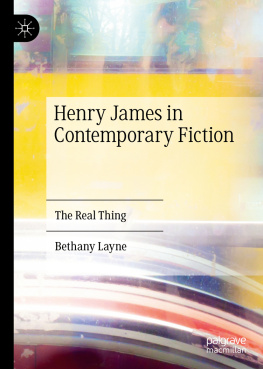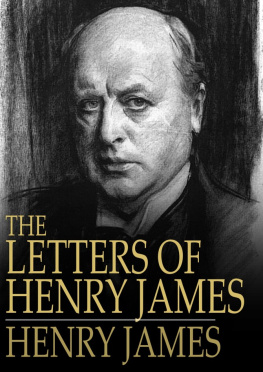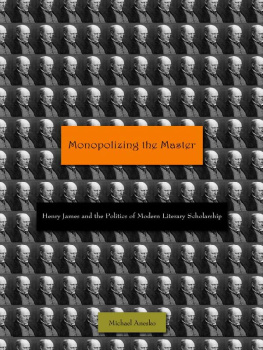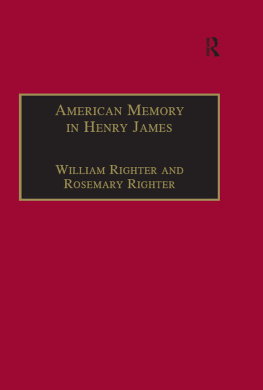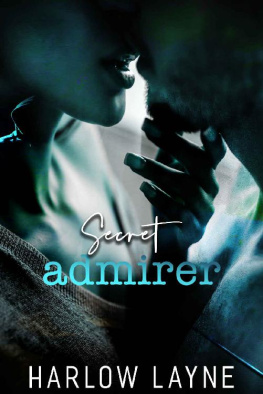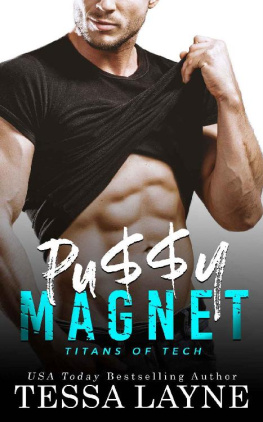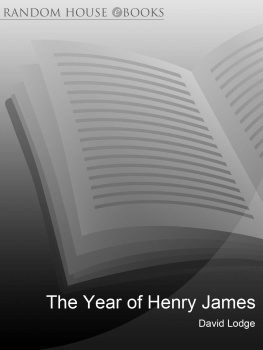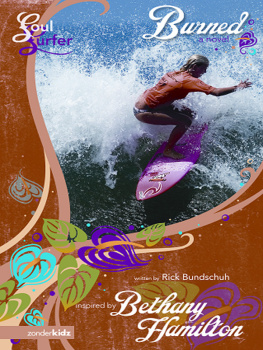Bethany Layne - Henry James in Contemporary Fiction The Real Thing
Here you can read online Bethany Layne - Henry James in Contemporary Fiction The Real Thing full text of the book (entire story) in english for free. Download pdf and epub, get meaning, cover and reviews about this ebook. year: 2020, publisher: Palgrave Macmillan, genre: Detective and thriller. Description of the work, (preface) as well as reviews are available. Best literature library LitArk.com created for fans of good reading and offers a wide selection of genres:
Romance novel
Science fiction
Adventure
Detective
Science
History
Home and family
Prose
Art
Politics
Computer
Non-fiction
Religion
Business
Children
Humor
Choose a favorite category and find really read worthwhile books. Enjoy immersion in the world of imagination, feel the emotions of the characters or learn something new for yourself, make an fascinating discovery.
- Book:Henry James in Contemporary Fiction The Real Thing
- Author:
- Publisher:Palgrave Macmillan
- Genre:
- Year:2020
- Rating:5 / 5
- Favourites:Add to favourites
- Your mark:
- 100
- 1
- 2
- 3
- 4
- 5
Henry James in Contemporary Fiction The Real Thing: summary, description and annotation
We offer to read an annotation, description, summary or preface (depends on what the author of the book "Henry James in Contemporary Fiction The Real Thing" wrote himself). If you haven't found the necessary information about the book — write in the comments, we will try to find it.
Henry James in Contemporary Fiction The Real Thing — read online for free the complete book (whole text) full work
Below is the text of the book, divided by pages. System saving the place of the last page read, allows you to conveniently read the book "Henry James in Contemporary Fiction The Real Thing" online for free, without having to search again every time where you left off. Put a bookmark, and you can go to the page where you finished reading at any time.
Font size:
Interval:
Bookmark:
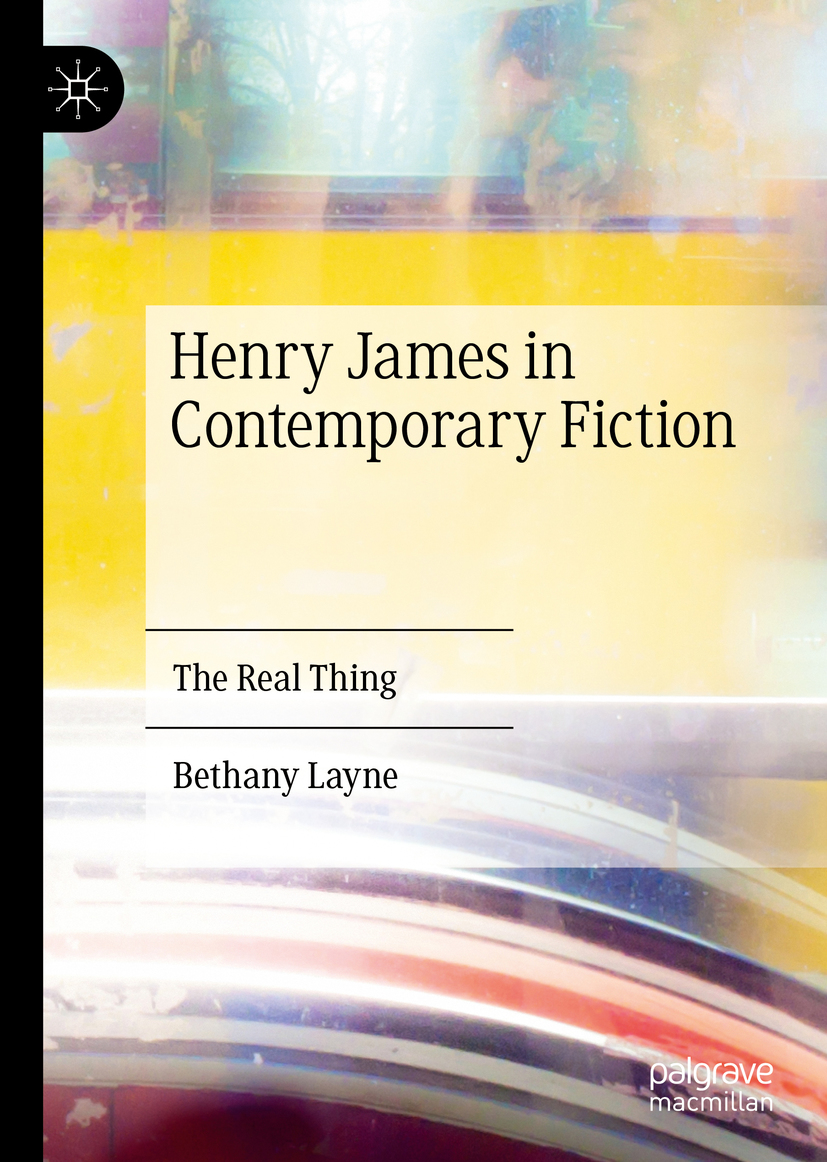

Cover illustration: Alex Linch shutterstock.com
This Palgrave Macmillan imprint is published by the registered company Springer Nature Switzerland AG.
The registered company address is: Gewerbestrasse 11, 6330 Cham, Switzerland
Henry James in Contemporary Fictionexplores the afterlife queering of James and his texts, feminist responses to James, the temptations and possibilities attached to recuperation, and the position of the reader with reference to the original. The study offers new insights into the nature of biofiction and its relationship with literary theory, and, in its emphasis on same-media appropriation, a significant contribution to adaptation theory.
Karen Scherzinger, author of Staging Henry James: Representing the Author in Colm TibnsThe Masterand David LodgesAuthor, Author:A Novel (2008) and The Jouissance of Influence: Being and Following the Writer in Michiel HeynssThe Typewriters Tale(2010)
For Alex, who I shared Jamess books with, and who shared me with Jamess books, and in memoriam Karen Scherzinger, who had such faith in this one.
The introduction to this book first appeared as The Turn of the Century: Henry James in Millennial Fiction,The Henry James Review39 (2018), 178194. An earlier version of my thoughts on Dictation was published as Henry would never know he hadnt written it himself: The Implications of Dictation (2008) for Jamesian Style,The Henry James Review35 (2014), 248256, while my work onInvisible Furiesappeared in a previous incarnation as Queering The Ambassadors: Michiel Heynss Invisible Furies and Jamesian Appropriation,Americana12 (2016), Web. Thanks are given to the editors of these journals for permission to reprint material.
I am grateful to my colleagues in the Institute of English at De Montfort University, Leicester, and to my former colleagues in the Department of English Literature, The University of Reading. Further thanks go to students on my Postmodernist Biofiction module at Reading for stimulating discussions ofAuthor, AuthorandThe Master, and to friends and peers in the Henry James Society and the Association of Adaptation Studies for generous and inspiring feedback on this work at numerous conferences. Finally, I thank my friends and family, especially my partner, Alex, and my mum, Jane, for their love and support throughout this books gestation.
is Senior Lecturer in English Literature at De Montfort University, Leicester. Her works on biographical fiction have been published extensively in journals, includingThe Henry James Review,Woolf Studies Annual, andAdaptation, and her interviews with David Lodge, Colm Tibn and Susan Sellers appear inConversations with Biographical Novelists: Truthful Fictions Across the Globe(2019). She pioneered the first specialist biofiction module in the UK, and is the editor of a volume of essays on the subject.
On a bright Saturday afternoon in the late summer of 2002, two men are introduced to each other in the front parlour of Lamb House. That they have both chosen this day for their visit is surprising, but not extraordinary: the National Trust opens Henry Jamess home to the public just two afternoons each week, and the writersfor writers they arehave good reason for wanting to make their pilgrimage before the house is closed for the season. What follows is rather more unexpected: the tenant, overhearing their conversation, unhooks the rope at the foot of the staircase and invites the writers to follow (Tibn , p. 18). He senses that it would not be tactful to mention this.
The men scribbling covertly in their notebooks are Michiel Heyns and Colm Tibn , and their forerunner was David Lodge. At present, only the tenant knows what soon the whole world will know: that all three are writing novels about the houses former inhabitant, of which two will be published amid a storm of publicity heralding The Year of Henry James . For in 2004, Lodges Author, Author and Tibns The Master coincided with Alan Hollinghursts The Line of Beauty, whose protagonist is a graduate student working on James , and with the paperback reissue of Felony, Emma Tennants novella about James and Constance Fenimore Woolson , first published in 2002 (Lodge , p. 75).
Others thought it unlikely that James , now resurrected, would die quietly (Saunders ).
This book examines the extraordinary proliferation of James-inspired narratives between the new millennium and the centenary of Jamess death. In doing so, I illuminate the reasons behind the novelistic fascination with his figure and fiction (Tintner ) ends, sacrificing Tintners encyclopaedic breadth for a more detailed and sustained discussion of a number of exemplary texts. I want to start by asking what developments in biographical and adaptive writing enabled millennial writers to engage so explicitly with James ? How can we start to explain his appeal for novelists working in these modes? And lastly, what forms have their engagement taken?
As noted by Lodge (, p. 8). To this definition, we must append a caveat regarding biofictions use of the subjects real name, a detail by which it distinguishes itself from the more numerous, but less explicit, engagements of
Font size:
Interval:
Bookmark:
Similar books «Henry James in Contemporary Fiction The Real Thing»
Look at similar books to Henry James in Contemporary Fiction The Real Thing. We have selected literature similar in name and meaning in the hope of providing readers with more options to find new, interesting, not yet read works.
Discussion, reviews of the book Henry James in Contemporary Fiction The Real Thing and just readers' own opinions. Leave your comments, write what you think about the work, its meaning or the main characters. Specify what exactly you liked and what you didn't like, and why you think so.

